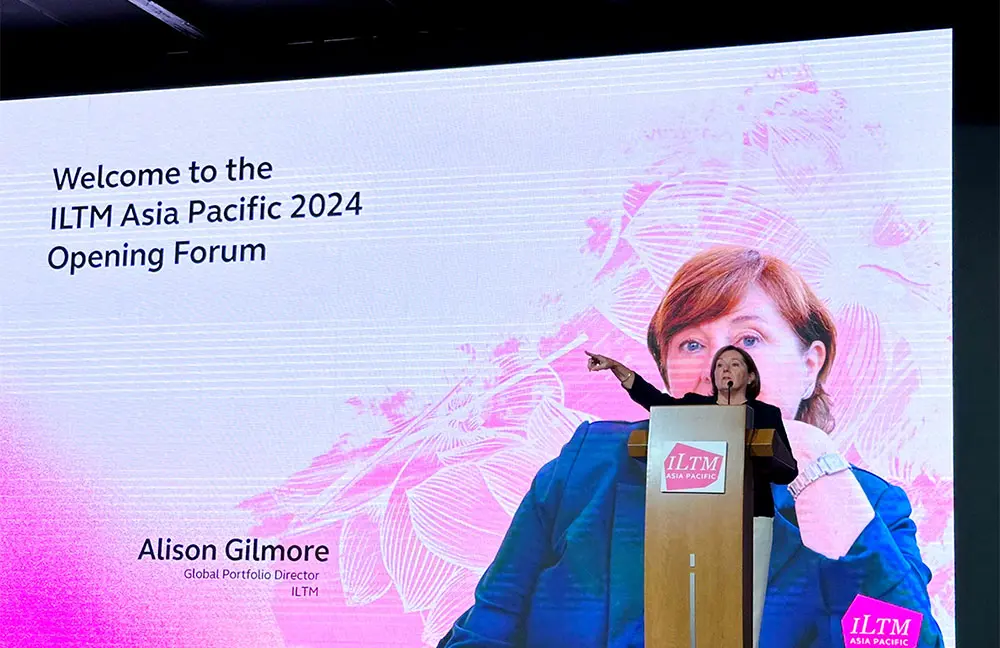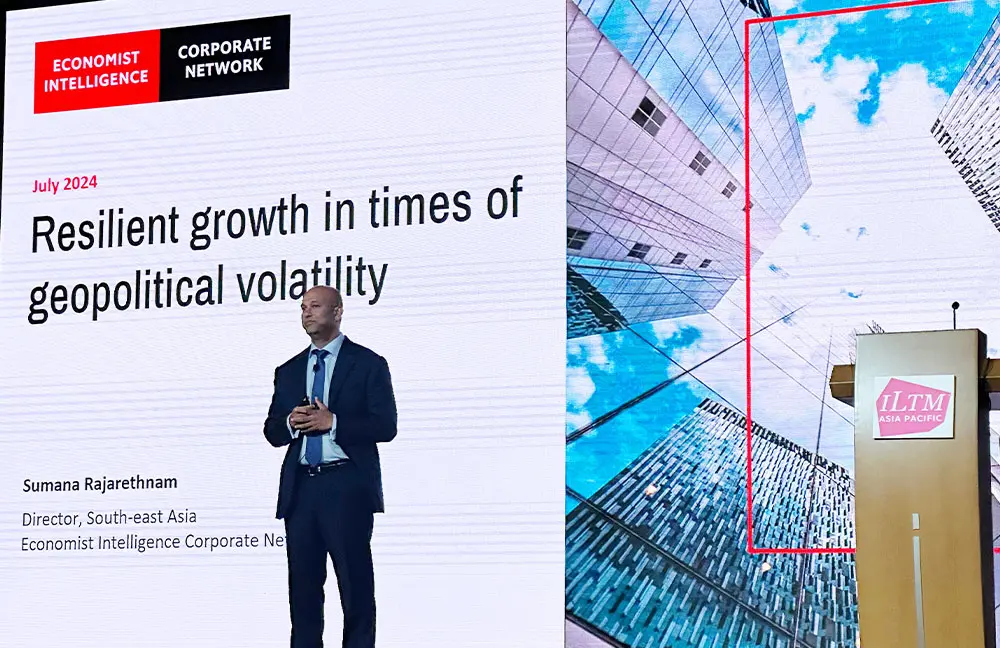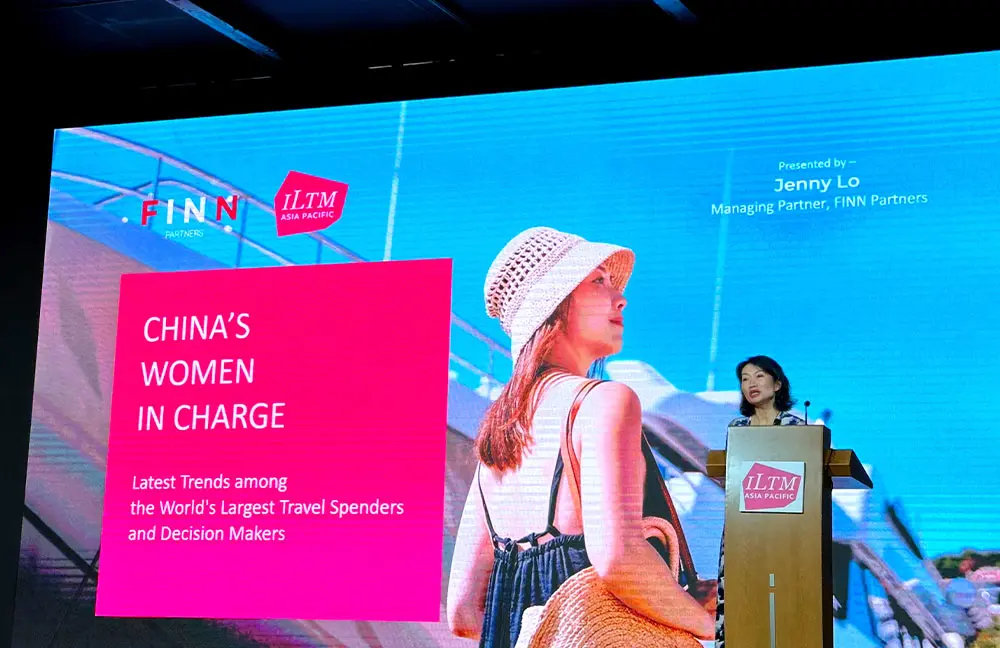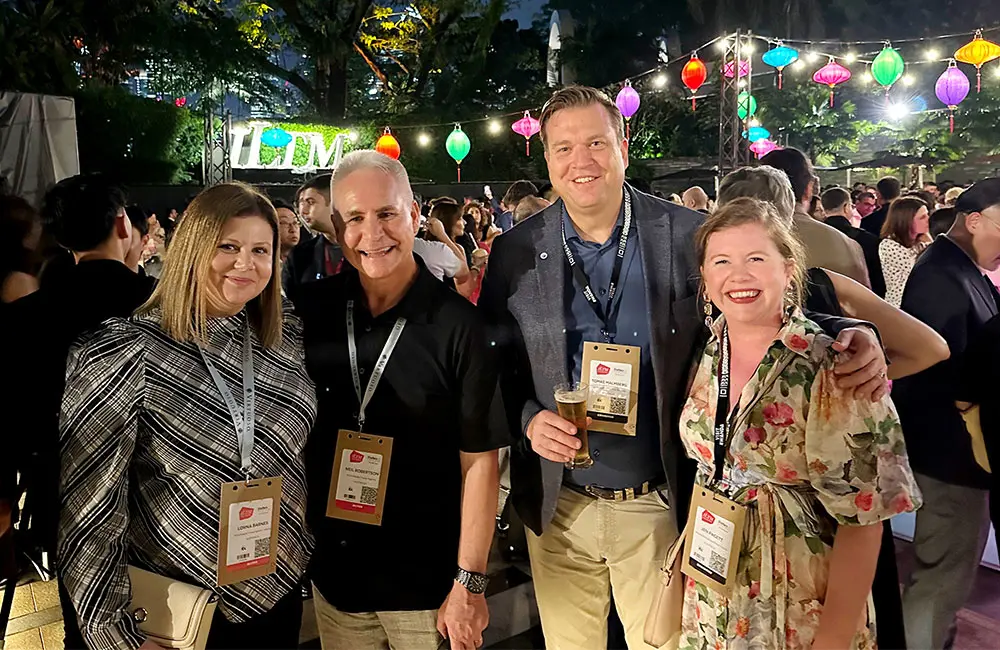ILTM Asia Pacific has commenced with more than 650 hand-selected travel advisors, more than 650 luxury travel providers, and more than 30 countries represented from across the region. Karryon Luxury reports from Singapore.
As with last year’s event, guests poured into The Ritz-Carlton Millenia Singapore’s ballroom for the official opening event of ILTM Asia Pacific. Outside, rain and a thunderstorm threatened to dampen the spirits of the poolside opening cocktail party.
Alison Gilmore, Portfolio Director, ILTM, welcomed attendees before announcing each of the keynote speakers.

According to the Economist Intelligence Corporate Network, Sumana Rajarethnam, Director of the Economist Intelligence Corporate Network for Southeast Asia, took the podium first and delivered a global economic outlook.
Asia is expected to account for 60 per cent of global GDP growth in 2024—higher than the pre-pandemic average—making it the main region for growth opportunities. Geo-economic risks are weighing on the growth outlook, with the rise of industrial policy likely having a major effect on the outlook for various industries in the region.
2024 will be a key year for elections in countries home to 4.2 billion people (more than half of humanity), which will spotlight the global state of democracy.
Rajarethnam said that if Donald Trump were to win the US election in November and his government were to impose an approximate 10 per cent rise in tariffs, it would have a highly inflationary effect in the US, leading to ripple effects around the world and increasing global inflation.

Meanwhile, in Asia Pacific, the biggest growth in the middle class is coming from Thailand, which is expected to grow by 10 per cent over the next four years.
He shared two slides with text and asked the crowd to identify which was written by ChatGPT. He then announced that, in fact, both slides were produced by AI, hoping to demonstrate that it is becoming increasingly difficult to discern between artificially produced-content and human-produced content.
“After the hype of chat GPT that really democratised what artificial intelligence is, and all of that over the last year, what we are seeing this year from our clients is that as the rubber hits the road, the actual implementation of AI is much, much lower than the hype. That’s not surprising because that is the usual progression of technology,” he said.
“But I think we’ll see a lot more…narrowly focused use-cases as what companies have a lot more success with. I just wanted to put that in your minds because it could potentially, of course, lead to a lot higher productivity and economic growth. But we do believe that it will take a much longer time than we think – probably around five to seven years,” he said.
The next guest speaker was Jenny Lo, Managing Partner of FINN Partners, who shared the findings of a new consumer intelligence research project conducted in association with ILTM Asia Pacific, titled ‘The Future of Travel in the Hands of China’s Female Travellers’.

Finn Partners surveyed more than 800 high-value female travellers aged 25 and above across 12 cities in China with the highest GDP to understand how Chinese women think about travel.
“Female Chinese travellers make 80 per cent of travel decisions and account for 6 out of 10 Chinese tourists last year,” Lo said.
“In the last few years, we have seen significant changes in social and cultural dynamics, with more young women choosing not to have children and female empowerment making remarkable progress. The motivations, preferences, spending and behaviours of Chinese female travellers are changing radically,” she said.
“Chinese women are harnessing their expanding economic and social influence, using travel as a means for self-discovery, cultural immersion and personal growth. There is a newfound sense of empowerment, driving them to embrace a new era of travel, marked by greater bonus and exploration,” said Lo.
“One of the main reasons behind such changes is the new luxury mindsets. Luxury is no longer defined by buying material things, showing off for prestige, signalling exclusivity or instilling a sense of belonging. Instead, the definition has shifted from external validation to self-contentment. High-value travellers across all age groups associate luxury with me-time, joy and a testament to achievement. This changing perception of luxury has taken place most obviously in the last 10 to 15 years as China’s economy continues to grow,” she said.
The survey revealed:
- 89 per cent prefer niche destinations
- 66 per cent are willing to pay more for unique, niche local experiences
- 61 per cent of women aged 35-45 are most likely to spend extra on hotels to ensure a luxury experience
- 45 per cent desire experiences in partnership with fashion and lifestyle brands
- There’s a solid trend towards more solo travel – with 73 per cent of married women planning to increase their solo travels in the next one to three years.
The final speaker, Simone Heng, a human connection specialist, took the stage and delivered a presentation on the power of human connection.

Raised in Perth and now based in Singapore, Heng shared the story of her hard-working father, who ran a news agency, and his masterful ability to build rapport and connect with his customers.
Her tips for the audience included the importance of listening to people and speaking to them about the things they are truly interested in as a means to foster connection and the importance of utilising body language, particularly hand gestures, in digital meetings.
During an age of rapidly growing AI and technology, Heng says that ‘human-centric’ experiences will only become more valuable.
“With AI, anything done by a human being moves higher up the value chain. Anything in terms of experiences that you’re planning – that are more bespoke, slightly flawed, slightly handcrafted, and perceived as more authentic in a world where everything else will be highly automated – becomes more valuable. I think we’re already seeing that in some trends in the travel industry,” she said.
Gilmore took to the microphone to announce that the rain had cleared and that The Ritz-Carlton’s ‘operation dry-up’ had been successful. Guests were then able to move to the outdoor pool area for the official cocktail party event.
ILTM Asia Pacific continues today with the commencement of supplier-buyer meetings on the showroom floor at Marina Bay Sands and press briefings with updates from luxury brands, including Small Luxury Hotels of the World, Hyatt Hotels, Accor, Crystal, Banyan Group and more.
For more information, visit iltm.com







